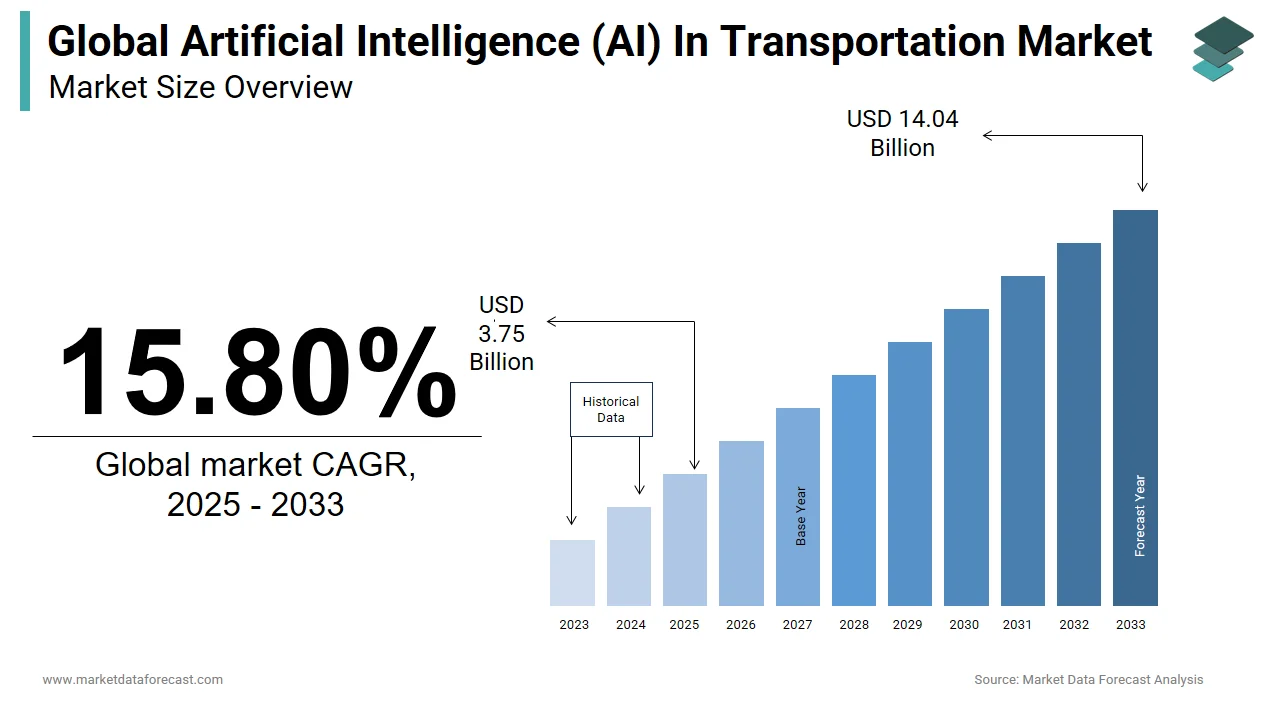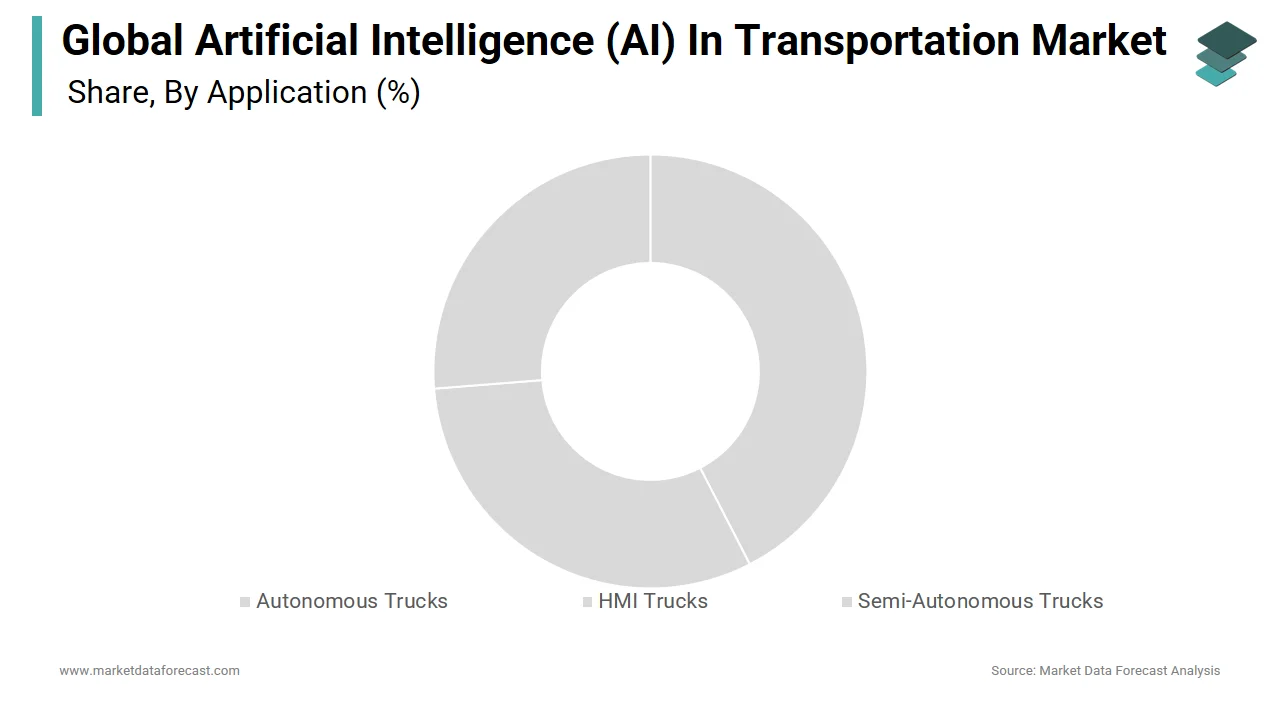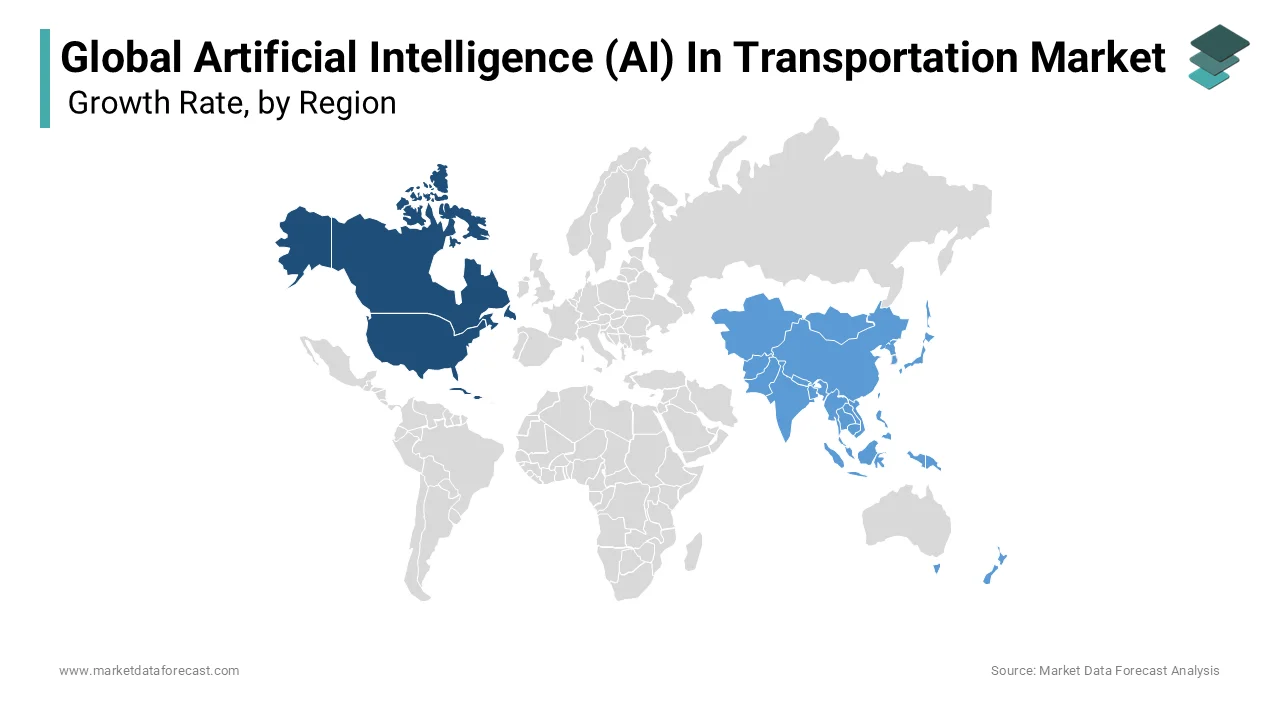Global Artificial Intelligence (AI) In Transportation Market Size, Share, Trends, & Growth Forecast Report – Segmented By Type (Machine Learning Technology, Process) Application (Autonomous Trucks, HMI Trucks, Semi-Autonomous Trucks) & Region - Industry Forecast From 2024 to 2032
Global AI in Transportation Market Size (2024 to 2032)
The global artificial intelligence (AI) in transportation market was worth USD 3.24 billion in 2023. The global market is expected to reach USD 3.75 billion In 2024 and 12.13 billion by 2032, growing at a CAGR of 15.80% during the forecast period.

Current Scenario of the Global AI in Transportation Market
The world has been affected by a wave of technological improvements in which artificial intelligence (AI) has spearheaded the technological revolution. Furthermore, a robust automation industry worldwide has also required the presence of artificial intelligence. The transportation sector has been the largest consumer of AI technologies. This factor must be evaluated with a level of scrutiny to understand the dynamics of global AI in the transportation market. The demand for AI for transportation has increased due to advances in automation technology. Artificial intelligence has become one of the most sought-after technologies in the world, driving the growth of global AI in the transportation market.
MARKET DRIVERS
The development of autonomous vehicles is a major determinant in the growth of AI in the transportation market.
AI is a crucial technology for autonomous driving systems because it is the only technology that enables reliable, real-time recognition of objects around the vehicle. Significant investments in the automotive industry are expected, particularly by major equipment manufacturers (OEMs), to optimize autonomous driving technology. Therefore, developing integrated autonomous vehicles with intelligent functionality is expected to drive global market growth in the long term.
There is an urgent need to ensure that long-distance freight transport is regulated and controlled with a high level of control, which has also led to the growth of the global market. Considering the abovementioned factors, the global market for AI in transportation is expected to accumulate significant revenues in the coming years. Rapid use of learning technology automation for product innovation, such as autonomous vehicles, parking and lane changing aids, and intelligent energy systems, strongly drives AI in the transportation market. In addition, the growing need for advanced transportation planning, driver behavior, data management, road marking, etc., is accelerating the market's growth.
MARKET RESTRAINTS
AI-based systems are primarily cloud-based, requiring expensive bandwidth to power the system. Also, it is a new technological solution requiring better training and skills, which translates into high costs; these significant challenges result in high operating costs for AI in transportation. Additionally, AI-powered machines include a variety of individual processors, relays, and other components that require maintenance and replacement from time to time, as well as a large amount of power to operate, resulting in high operating costs. These challenges significantly impact the growth of global artificial intelligence in the transportation market.
REPORT COVERAGE
|
REPORT METRIC |
DETAILS |
|
Market Size Available |
2023 to 2032 |
|
Base Year |
2023 |
|
Forecast Period |
2024 to 2032 |
|
CAGR |
15.80% |
|
Segments Covered |
By Application, Type, and Region |
|
Various Analyses Covered |
Global, Regional & Country Level Analysis, Segment-Level Analysis, DROC, PESTLE Analysis, Porter’s Five Forces Analysis, Competitive Landscape, Analyst Overview on Investment Opportunities |
|
Regions Covered |
North America, Europe, APAC, Latin America, Middle East & Africa |
|
Market Leaders Profiled |
Daimler AG, MAN SEPACCAR Inc., Scania Group, ZF Friedrichshafen AG, Intel Corporation, and Valeo SA and Others. |
SEGMENTAL ANALYSIS
Global AI in Transportation Market Analysis By Application

Autonomous trucks had the largest market share in the transportation AI market 2019. The trucking industry's increasing development is increasing demand for autonomous trucks. In addition, the growth of the logistics industry for transporting goods in the United States drives the need for autonomous trucks. It is also estimated that more than 65% of the merchandise is transported by truck in the world, accelerating the growth of this application. The deployment of autonomous trucks will also reduce maintenance and administration expenses by approximately 45%. These key factors will drive the demand for artificial intelligence in the transportation industry, thus providing autonomous driving and impeccable passenger safety.
REGIONAL ANALYSIS

North America is supposed to remain the most significant area in AI in the transportation market during the conjecture period. Trucks make up most of the shipping business in the US. Increasing interest in self-ruling trucks and administrative improvements identified with consistency, security, and duty (CSA) in the nation will likely see the United States as the most significant. Asia Pacific (APAC) is expected to experience the fastest growth during the period. This is mainly due to higher truck sales in the region and the increasing use of AI in transportation in countries like Japan and China. Japan is estimated to be the fastest-growing country in the Asia Pacific transportation AI market during the outlook period. In the maturing Japanese truck market, companies are finding new revenue streams by integrating AI-based functionality into trucks, further supporting APAC's rapid growth.
KEY PARTICIPANTS IN THE GLOBAL AI IN TRANSPORTATION MARKET
The major companies operating in the global AI in transportation market include Daimler AG, MAN SEPACCAR Inc., Scania Group, ZF Friedrichshafen AG, Intel Corporation, and Valeo SA.
RECENT HAPPENINGS IN THE GLOBAL AI IN TRANSPORTATION MARKET
- Mikael Johansson develops autonomous vehicles and artificial intelligence solutions at Scania.
- The new universal search engine using the latest artificial intelligence technology means that Scania workshops solve vehicle-related problems more quickly.
- Renowned market intelligence firm Infiniti Research has announced the completion of its latest article on AI in Transportation.
- From production to product, from sales to legal services: Artificial intelligence (AI) opens new avenues for the automotive industry to improve the customer experience further and make processes more efficient. To seize these opportunities responsibly, Daimler AG is the first automaker to establish AI management principles.
DETAILED SEGMENTATION OF THE GLOBAL AI IN TRANSPORTATION MARKET INCLUDED IN THIS REPORT
This research report on the global AI in transportation market has been segmented and sub-segmented based on the application, type, and region.
By Application
- Autonomous Trucks
- HMI Trucks
- Semi-Autonomous Trucks
By Type
- Machine Learning Technology
- Computer Vision
- Context Awareness
- Deep Learning
- Natural Language Processing
- Process
- Data Mining
- Image Recognition
- Signal Recognition
By Region
- North America
- The United States
- Canada
- Rest of North America
- Europe
- The United Kingdom
- Spain
- Germany
- Italy
- France
- Rest of Europe
- The Asia Pacific
- India
- Japan
- China
- Australia
- Singapore
- Malaysia
- South Korea
- New Zealand
- Southeast Asia
- Latin America
- Brazil
- Argentina
- Mexico
- Rest of LATAM
- The Middle East and Africa
- Saudi Arabia
- UAE
- Lebanon
- Jordan
- Cyprus
Frequently Asked Questions
How is AI contributing to the development of autonomous vehicles worldwide?
AI powers autonomous vehicles by integrating sensors, machine learning algorithms, and computer vision systems to navigate complex environments, improving safety and efficiency on a global scale.
What are the key applications of AI in the logistics and supply chain within the global transportation industry?
AI optimizes route planning, demand forecasting, and inventory management, streamlining supply chains and reducing costs, enhancing efficiency across global logistics networks.
How does AI contribute to energy efficiency and sustainability in the transportation industry worldwide?
AI optimizes fuel consumption, route planning, and fleet management, leading to reduced emissions and improved energy efficiency, contributing to global sustainability goals.
How is AI addressing the last-mile delivery challenges faced by global e-commerce companies in the transportation sector?
AI streamlines last-mile delivery by optimizing route planning, predictive analytics for demand, and robotic solutions, improving the efficiency and reliability of global e-commerce logistics.
Related Reports
Access the study in MULTIPLE FORMATS
Purchase options starting from $ 2500
Didn’t find what you’re looking for?
TALK TO OUR ANALYST TEAM
Need something within your budget?
NO WORRIES! WE GOT YOU COVERED!
Call us on: +1 888 702 9696 (U.S Toll Free)
Write to us: [email protected]